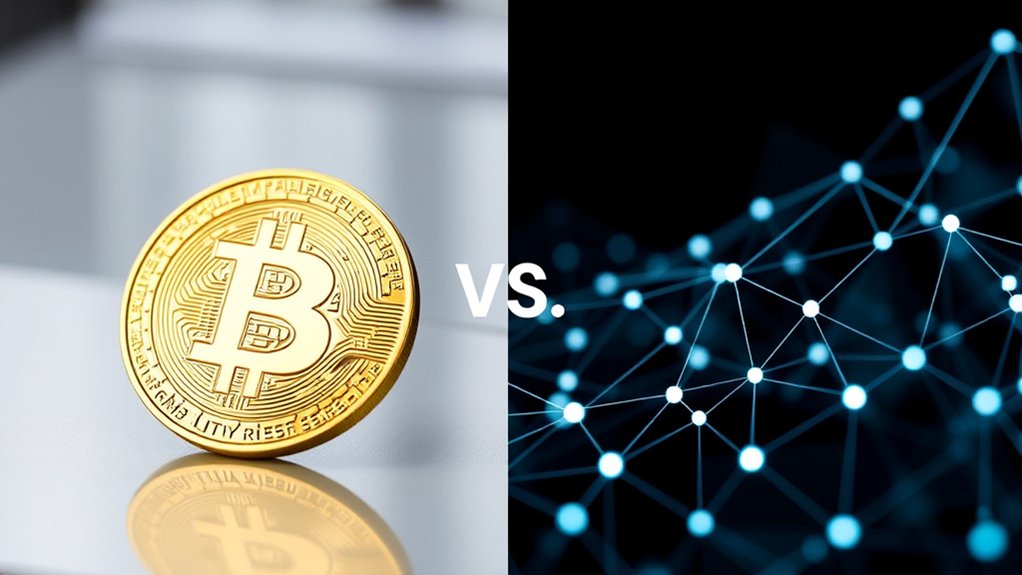Cryptocurrency and blockchain? They’re not the same thing. Think of cryptocurrency as money you can’t touch, like digital cash. Blockchain? That’s the tech behind it, like the wheels that make a car move. Cryptos need blockchain to exist, or they’d be, well, useless. Blockchain keeps things secure and transparent—no central boss. They’re both growing fast and affect more than just your bank account. Stick around to uncover how this tech is shaking things up beyond just money.

In the world of digital currency, cryptocurrency and blockchain often get tossed around like they’re the same thing. Spoiler alert: they’re not. Cryptocurrency is a digital or virtual currency that uses cryptography for security and operates independently of any central authority. Think of it as an online money that doesn’t need a bank.
On the other hand, blockchain is the technology behind the magic. It’s a decentralized digital ledger that records transactions across multiple computers, ensuring that every transaction is securely documented. So, while one is the shiny coin, the other is the shiny machine that makes it work.
Cryptocurrency primarily serves as a medium of exchange and a store of value. You want to buy a coffee with Bitcoin? Go for it. But here’s the kicker: cryptocurrencies rely on blockchain technology to function. Without blockchain, cryptocurrencies are like a car without wheels—pretty useless. Blockchain technology is the underlying system enabling the creation and management of cryptocurrencies. Additionally, the decentralization of blockchain ensures that no single entity controls the data, enhancing its security.
Cryptocurrencies are like cars—great for driving value, but they need blockchain wheels to hit the road!
Blockchain offers security and transparency through a decentralized system, meaning there’s no big boss controlling everything. It’s all about that distributed power, baby! Moreover, the public ledger feature of blockchain enhances trust among users, as everyone can independently verify transactions.
Now, let’s talk versatility. Blockchain isn’t just for cryptocurrencies. Nope, it’s got a resume that includes finance, healthcare, voting systems, and more. It can store all kinds of data securely, making it a tech superstar.
Meanwhile, cryptocurrencies are digital assets. They’re stored and shared electronically, typically in limited supply, which adds a bit of rarity to the mix.
Yet, both share a few things in common. They’re both intangible, decentralized, and protected by fancy security measures. They’re rapidly growing, too.
And as technology evolves, the potential for both blockchain and cryptocurrency is massive!
Frequently Asked Questions
Can Blockchain Technology Be Used Without Cryptocurrency?
Absolutely, blockchain can strut its stuff without cryptocurrency.
It’s like a party where the cash isn’t invited. Think private blockchains used in businesses—no coins necessary.
Smart contracts? Yup, they can operate without crypto rewards.
And let’s not forget NFTs and supply chains, both thriving without a single digital coin in sight.
What Are Some Popular Cryptocurrencies?
When it comes to popular cryptocurrencies, the list isn’t short.
XRP speeds through international transactions.
Solana? It’s the smart contract king, also dabbling in NFTs.
Stellar focuses on cross-border payments and is up 25% this year.
Chainlink? It’s the oracle service expert, boasting a solid 19.6% gain.
And let’s not forget Bitget Token, riding high with a 17.7% increase.
How Does Mining Work in Cryptocurrency?
Mining in cryptocurrency is like a high-stakes game of Sudoku, but with massive energy bills. Miners solve complex puzzles—think math on steroids—to finalize transactions on the blockchain.
They need fancy machines, not your average laptop, to crunch numbers and create new coins as rewards. It’s competitive and super energy-intensive, raising eyebrows about environmental impact.
But hey, someone’s got to secure those transactions and keep the crypto party going, right?
Is Blockchain Technology Secure Against Hacking?
Blockchain technology is pretty secure against hacking. Why? It’s decentralized, meaning no single point to attack. Each node holds its own data, making it a nightmare for hackers.
Sure, vulnerabilities exist—like Sybil and 51% attacks—but that’s like saying a fortress has a few cracks. With advanced encryption and consensus algorithms, it’s tough to tamper with transactions.
What Are the Environmental Impacts of Cryptocurrency Mining?
Cryptocurrency mining is a real environmental nightmare.
Think about it: Bitcoin mining alone emits over 85 megatons of CO2—like a small country’s worth! Most of this energy comes from fossil fuels, with coal being a major player.
The mining process also guzzles water and creates a ton of electronic waste. Meanwhile, only a tiny fraction uses clean energy.





